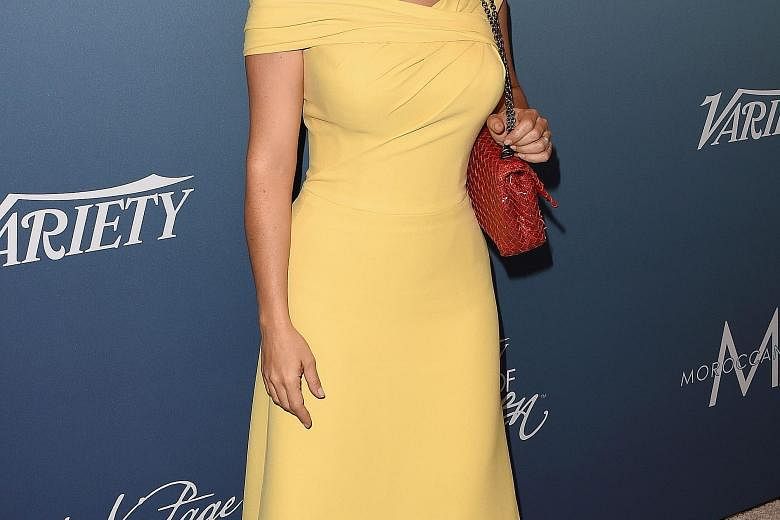LOS ANGELES • In a week that saw Meryl Streep speak out about equal pay and other actresses of the 2015 film Suffragette applaud the domestic violence protesters who invaded their premiere, the topic took centre stage at a Los Angeles event last Friday.
The Power Of Women event hosted by trade magazine Variety honoured talk-show host Oprah Winfrey, actress Anna Kendrick, YouTube CEO Susan Wojcicki among others.
On the red carpet, conversation quickly turned to the fight for gender equality in Hollywood.
"I feel that women are more united than ever, and I think it's now more obvious than ever and that people are beginning to show some support because we are - our demographic - a very strong economical power also as moviegoers," actress Salma Hayek said.
The issue of pay disparity grabbed headlines last year after a leak of stolen e-mail from Sony Pictures Entertainment showed that Oscar-winning actress Jennifer Lawrence was paid less than her male co-stars in the 2013 hit movie American Hustle.
Patricia Arquette also railed against the industry's gender-based wage gap during her acceptance speech after winning an Oscar at this year's Academy Awards.
Some of Hollywood's highest profile stars, such as Emma Watson and Gwyneth Paltrow, also have chimed in, helping put the issue in the spotlight.
"Your salary is a way to quantify what you're worth. If men are being paid a lot more for doing the same thing, it feels s*****," Paltrow told Variety.
"Look, nobody is worth the money that Robert Downey Jr is worth," she said of her co-star in the 2009 movie Iron Man. "But if I told you the disparity, you would probably be surprised."
According to Forbes magazine's 2015 list of best-paid actors, Downey topped the list for the third year in a row earning a whopping US$80 million (S$111.6 million).
That is nearly US$30 million more than Lawrence, the best-paid actress, with US$52 million.
Last Friday, Hayek said it was a problem that went beyond Hollywood.
"This is a problem that is in every single industry," she said. "If you have the same capacities and you are doing the same job, it is criminal not to pay the same salary."
Paltrow, whose US$9 million in earnings ranked her 12th on Forbes' list of highest-paid actresses in Hollywood this year, said at the event that women in Hollywood have been criticised for speaking about disparities in pay.
"You were considered ungrateful, you were considered entitled, so I think it's amazing that women now are saying, 'We're going to talk about this. This isn't fair,'" she said.
When asked if she could foresee a time when pay will be equal between the sexes, she replied: "I think so.
"When I look at my daughter and her peers and I look at the millennial women, I think it's all about to change."
And at a time when women in Hollywood are increasingly standing up for their rights, actress Ashley Judd is also telling a story of the despised "casting couch".
She told Variety that "one of the industry's most famous, admired" bosses - whom she declined to name - had lured her to his hotel suite in the late 1990s.
After it became clear that she would not return his sexual advances, he asked if she would watch him shower.
"I did not recognise at the time what was happening to me," she said in the latest issue of the magazine.
"It took years before I could retrospectively evaluate that incident, and realise there was something incredibly wrong and illegal about it."
Although Judd's story is by no means unique, harassment of women in Hollywood is only the most explicit manifestation of their treatment as second-class citizens.
"A lot of people are speaking out and the subject of sexism in Hollywood is trending," said Ms Jennifer Merin, head of the Alliance of Women Film Journalists.
"But that can be something dangerous as well because it can become a trend and then disappear."
Ms Kirsten Schaffer, executive director of Women in Film, an advocacy group, said that while the outcry over gender disparities in the film industry is gaining steam, much still needs to be done before Hollywood's glass ceiling is shattered.
"There are a lot more women in the last six months speaking out publicly against sexism," she said. "But there is a lot of room for growth."
According to a report by the Center for the Study of Women in Television and Film at San Diego State University in California, only seven per cent of the top 250 movies last year were directed by women.
The numbers are not much better when it comes to other jobs behind the camera, including writers, executive producers and editors.
"Those numbers haven't changed in 20 years," said Ms Martha Lauzen, executive director of the centre. "Women's under-representation both on screen and behind screen has been an issue since the 1940s.
"But what is new is that those high-profile individuals are feeling comfortable about speaking out... aided by a cultural zeitgeist in favour of greater diversity overall."
Given the industry's track record on sexism, what may prove a tipping point is the fact that rights groups such as the American Civil Liberties Union are now demanding answers from Hollywood, she said.
"This is an industry that has had no oversight for the hiring of women either on screen or behind the scenes, so they have acted badly," she said.
"I think a little pressure from the outside could be helpful."
REUTERS, AGENCE FRANCE-PRESSE

